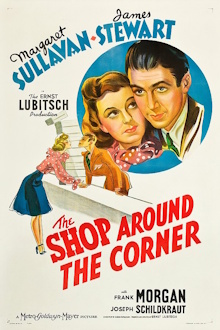Here’s another film directed by Ernst Lubitsch and really it’s James Stewart in the leading role that is the draw for me. I don’t believe I’ve ever seen a single film he has been in that I’ve disliked. The titular shop in this is definitely grander than I’d imagined, more like a department store, and it’s another film with a very obvious gimmick. Still Lubitsch makes it work and both Stewart and Margaret Sullavan are excellent in it. I think it’s a little mean how everyone except the girl learns the truth fairly early on and keep her in the dark. But it does make for great fast-paced fun throughout and now I’ve learned that the 1998 film You’ve Got Mail is considered a remake of this.
Every morning, the employees of a leather goods shop Matuschek and Company in Budapest gather outside to wait for the arrival of the owner Hugo Matuschek to open the shop. The most senior of the staff is salesman Alfred Kralik whose opinions are highly valued by the boss. One morning, Alfred reveals to his friend a Pirovtitch, a married family man, that he has been corresponding with a woman who he believes is intelligent and cultured and hopes to woo her. Later a young woman Klara Novak arrives looking for a job. She persuades Matushek to hire her despite the poor economy by successfully selling a cigarette box that plays music to a customer. She is assigned to work under Alfred but the two do not get along. She too has been a corresponding with a mystery and of course it is Alfred but neither of them are aware that it is the other. Over time, Matuschek’s relationship with Alfred sours as he suspects of him of having an affair with his wife. As Christmas nears, Matuschek orders everyone to work overtime to redo the window decoration on the same night that Alfred and Klara are supposed to meet one another for the first time. When Alfred expresses his dissatisfaction, he is fired but he is innocent as it is another employee who has been seeing and getting money from Matuschek’s wife.
The broad strokes of the plot are easily predictable once you realize that both Alfred and Klara are both corresponding by letter with an unseen paramour, building up an ideal romantic companion that exists in their own minds. Then there’s Vadas, who is always snappily dressed and obsequious to the boss but loves to gossip and maliciously twists the words of others. No prizes for guessing who the real villain is. It’s still wonderfully entertaining to watch the events play out because of the vivid characterization of each of the supporting characters. Petrovitch who is genuinely Alfred friend but is careful to avoid offending the boss to keep his job, Pepi the brash up and coming errand boy, Matuschek himself who strikes an interesting balance between being a compassionate boss and a business owner who needs to make money. It’s no wonder the play Parfumerie by Miklós László it was based on was such a success. It’s a Christmas film due to its setting but it’s also not really about Christmas itself, and so doesn’t fall into the usual niches and feels very refreshing.
I can think of at least a couple of scenes which elevate this to greatness. One is when Matuschek finally fires Alfred. There are no histrionics. Matushcek simply lets him go quietly with a final pay cheque and a glowing letter of recommendation. Alfred then trudges out of the office, as if not quite believing that it actually happened, while the other employees take pity on him. It’s a hard-hitting scene showing a scenario that is all the more effective because of how ordinary it is and yet how great an impact it has on Alfred, or indeed any employee who loses a job he or she really needs. The other famous shot has no dialogue at all and shows Klara’s hand grasping in the post office box for a letter that isn’t there and her despondent face afterwards. That single image encapsulates the character pinning all of her hopes on a mirage. That said, it’s still a film of its era and contains more than a whiff of sexism. Alfred has far more agency than Klara and it’s cruel how he keeps her in the dark for so long. We never get to see Matuschek’s wife and she is perfunctorily dismissed as a money-grubbing cheater. Similarly none of the other female employees in the shop are real characters as even Pepi has a more substantial role than them.
Anyway this was more enjoyable than I’d expected and I note that Lubitsch himself apparently considered it the best film of his career. Stewart out acts everyone else but is so tall and thin that he looks a little out of place. I’m not convinced that the film uses the Budapest setting well as it’s just America, just with the names of people, places and the currency changed. The modernized You’ve Got Mail is probably a good initiative then but I haven’t watched it and currently have no plans to.
